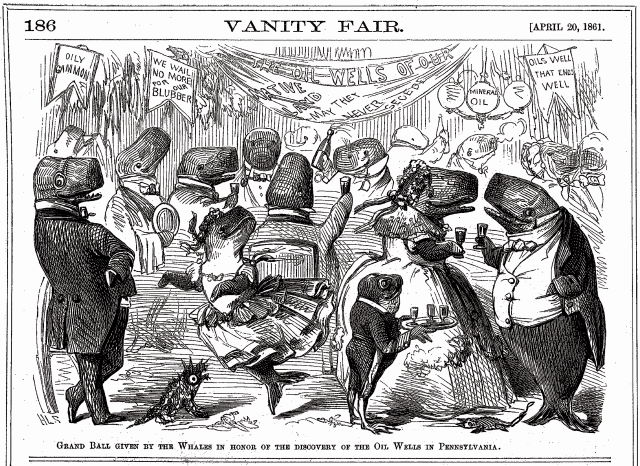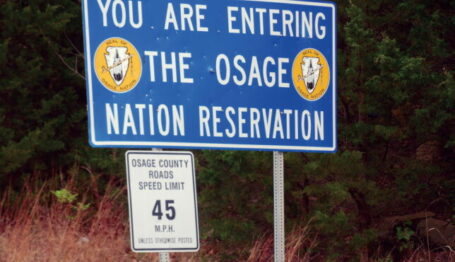Green Watch
Antidote for “Apocalyptic Environmentalists”: Nuking a Reasonable Compromise
 Shellenberger writes of a cartoon run in an 1861 issue of Vanity Fair, “showing sperm whales . . . dressed in tuxedos and ball gowns, toasting one another with champaign” and a caption reading “Grand ball given by the whales to celebrate the discovery of the oil wells in Pennsylvania.” Credit: Yale University. License: https://bit.ly/3ppgeTK.
Shellenberger writes of a cartoon run in an 1861 issue of Vanity Fair, “showing sperm whales . . . dressed in tuxedos and ball gowns, toasting one another with champaign” and a caption reading “Grand ball given by the whales to celebrate the discovery of the oil wells in Pennsylvania.” Credit: Yale University. License: https://bit.ly/3ppgeTK.

Oliver Stone’s Antidote for “Apocalyptic Environmentalists” (full series)
Apocalypse Never | “Environmental Colonialism”
Nuking a Reasonable Compromise
Nuking a Reasonable Compromise
Against all this Shellenberger notes that “a single Coke can of uranium can provide enough energy for an entire high-energy life.” The book’s advocacy of nuclear energy is arguably its most important and potentially game-changing argument.
Even strident climate change skeptics should consider Shellenberger’s pragmatic case for nukes.
Every other form of serious energy production (for electricity and otherwise) is significantly more dangerous than nuclear power. In April 2010, the Deepwater Horizon oil platform fire in the Gulf of Mexico killed 11 people, and four months later a natural gas pipeline in California blew up, killing eight more. Coal mining is even more dangerous. And the 1975 collapse of a hydroelectric dam in China killed more than 100,000. In comparison, Shellenberger notes the radiation-caused death toll for the 2011 Fukushima nuclear accident stands at … zero. Even including the 1986 Chernobyl disaster and all other accidents in the entire history of civilian nuclear power he tallies up just over 100 nuclear (i.e.: radiation) fatalities.
The potential for redirecting wasteful solar and wind energy subsidies to more useful endeavors should also be appealing. The Apocalypse Never tally for total world spending on the development of nuclear energy, 1965 through 2018, is $2 trillion. The comparable figure for wind and solar was $2.3 trillion. Yet “the world received about twice as much electricity from nuclear” during that period.
Imagine a healthy compromise in which Republicans and Democrats agreed to end decades of dangerous bickering over climate and energy in favor of directing all the policy and money toward proven nuclear power? We would all be better off.
The value of this deal to both climate alarmists and anyone else worried about rising global temperatures should be self-evident. These folks are the primary audience for the message of Apocalypse Never, which prompted the praise from Oliver Stone for such a direct hit on target.
But it will still be a difficult sell. Despite the clear zero-carbon advantages, major left-wing environmental organizations such as the Sierra Club and some of the most prominent climate alarmists remain wedded to the failed wind and solar mirages, and resolutely opposed to nuclear energy. Shellenberger lays out the sordid history of how Sierra evolved from sensible to unreasonable on nuclear power.
He makes a case that the anti-nuke Left has interesting allies: “Between 2016 and 2019, the five largest publicly traded oil and gas companies—ExxonMobil, Royal Dutch Shell, Chevron Corporation, BP, and Total—invested a whopping $1 billion into advertising and lobbying for renewables and other climate-related ventures.”
But not nuclear? Well, no. Shellenberger notes, “Killing nuclear plants turns out to be a lucrative business for competitor fossil fuel and renewable energy companies.” He uses the example of the Indian Point nuclear station in New York, which over 40 years could pull in $32 billion in revenue, but “[i]f the plant closes, those billions will flow to natural gas and renewable companies.” The Sierra Club’s annual revenue exceeds $100 million.
Apocalypse Never explains there are logical connections to these facts.
Shellenberger raises other fascinating (that is, appalling) land-use concerns beyond just energy.
For example, pasture-raised beef “requires fifteen to nineteen times more land per kilogram than industrial beef.” Because those cows live much longer, they also “produce more manure and methane,” which adds up to “300 to 400 percent more carbon emissions per kilogram.” So, the sanctimonious food crowd at the organic grocer is placing their dietary fetish ahead of rangeland for gorillas and other endangered creatures. Similar concerns exist for fish and other major meat sources. He writes that even eating vegetarian doesn’t add up to much of a difference versus eating meat because studies show the veggie consumers end up spending the money they’re saving on carbon-heavy toys and services.
Saving the critters also often means embracing that which we have been taught to hate.
In the earliest days of the 19th century Pennsylvania oil strike, a single well was producing “as much oil as it took a whaling voyage three or four years to obtain.” Shellenberger writes of a cartoon run in an 1861 issue of Vanity Fair, “showing sperm whales … dressed in tuxedos and ball gowns, toasting one another with champaign,” and a caption reading “Grand ball given by the whales to celebrate the discovery of the oil wells in Pennsylvania.” A subsequent 20th century threat to whales emerged when their oil became valuable for making margarine and soap but was similarly defeated when industry created more lucrative artificial alternatives such as vegetable oil.
By the time international treaties prohibited most whaling, capitalism had already saved them. The chapter on this is titled “Greed Saved the Whales, Not Greenpeace.”
Back in the first chapter the reader learns of a 2020 survey of British schoolkids showing one of five “was having nightmares about climate change.” Three years earlier the American Psychological Association “diagnosed rising eco-anxiety” which it defined as “a chronic fear of environmental doom.”
There is no excuse for the politicians, schools, media, and advocacy organizations that immorally inflict these needless terrors on children. But there is an antidote: Apocalypse Never.
It even worked on Oliver Stone.



